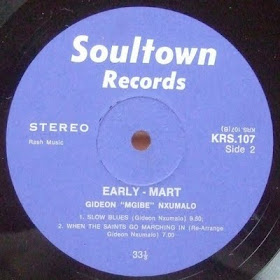
A very special and rare treat for electricjive readers today. It represents a holy grail amongst collectors of South African jazz and is spoken of in hushed tones. The problem with these "rare as hen's teeth" records is that not enough people have heard them! The record is Gideon Nxumalo's big band tribute to the great South African drummer Early Mabuza. It is also the first jazz album recorded by Rashid Vally on his Soultown label in early 1970. Before recording jazz Vally released dance bands like the El Ricas and the High Notes. After this foray into jazz Vally's partnership with Abdullah Ibrahim led to the establishment of the As-shams/Sun label and the albums Peace, With Kippie Moeketsi, Underground in Africa and then the big breakthrough Mannenberg.
Early Mart is the last album Nxumalo made before passing away - aged 40 - on 24th December 1970. For more on Gideon "Mgibe" Nxumalo check out our earlier posting of the seminal "Jazz Fantasia" LP.

"The sound is African, modern, avant garde." says Leslie Sehume, author of the recited poem on side 1.
The handwritten notes on the sleeve indicate that the band members could include:
Gideon Nxumalo - Piano
Johnny Selilo - Trumpet
Allen Kwela - Guitar
Kleintjie Rubushe - Trumpet
Blyth Mbityana - Trombone
Valley Ngwenya - Baritone Sax
Dennis Nene - Flute
Gordon Mfanchu - Drums
Morris Mnana - Bass
McKay Davashe - Tenor Sax

MF








